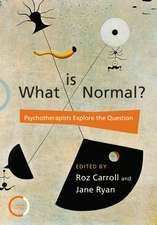Normality Does Not Equal Mental Health: The Need to Look Elsewhere for Standards of Good Psychological Health
Autor Steven James Bartletten Limba Engleză Hardback – 11 sep 2011 – vârsta până la 17 ani
"Normality Does Not Equal Mental Health: The Need to Look Elsewhere for Standards of Good Psychological Health" is a groundbreaking work, the first book-length study to question the equation of psychological normality and mental health. Its author, Dr. Steven James Bartlett, musters compelling evidence and careful analysis to challenge the paradigm accepted by mental health theorists and practitioners, a paradigm that is not only wrong, but can be damaging to those to whom it is applied--and to society as a whole.
In this bold, multidisciplinary work, Bartlett critiques the presumed standard of normality that permeates contemporary consciousness. Showing that the current concept of mental illness is fundamentally unacceptable because it is scientifically unfounded and the result of flawed thinking, he argues that adherence to the gold standard of psychological normality leads to nothing less than cultural impoverishment.
Preț: 358.85 lei
Preț vechi: 416.91 lei
-14% Nou
68.67€ • 73.43$ • 57.25£
Carte tipărită la comandă
Livrare economică 17 aprilie-01 mai
Specificații
ISBN-10: 031339931X
Pagini: 336
Dimensiuni: 156 x 235 x 33 mm
Greutate: 0.66 kg
Ediția:New.
Editura: Bloomsbury Publishing
Colecția Praeger
Locul publicării:New York, United States
Caracteristici
Notă biografică
Cuprins
Recenzii
- PsycCRITIQUES
Descriere
Normality Does Not Equal Mental Health: The Need to Look Elsewhere for Standards of Good Psychological Health is a groundbreaking work, the first book-length study to question the equation of psychological normality and mental health. Its author, Dr. Steven James Bartlett, musters compelling evidence and careful analysis to challenge the paradigm accepted by mental health theorists and practitioners, a paradigm that is not only wrong, but can be damaging to those to whom it is applied—and to society as a whole.
In this bold, multidisciplinary work, Bartlett critiques the presumed standard of normality that permeates contemporary consciousness. Showing that the current concept of mental illness is fundamentally unacceptable because it is scientifically unfounded and the result of flawed thinking, he argues that adherence to the gold standard of psychological normality leads to nothing less than cultural impoverishment.
















